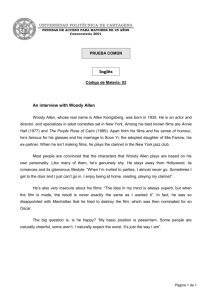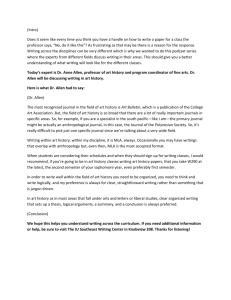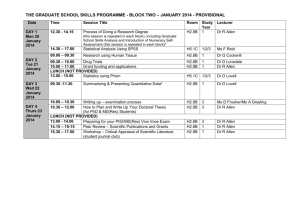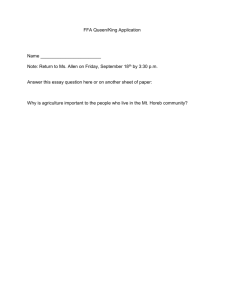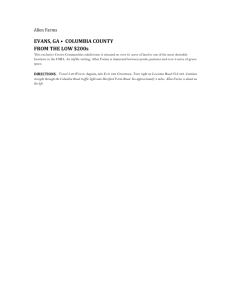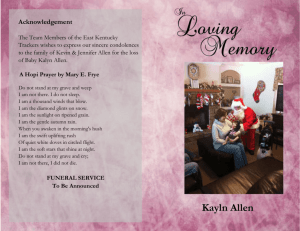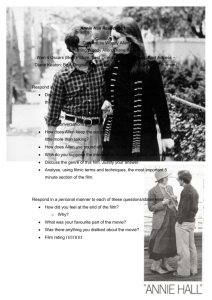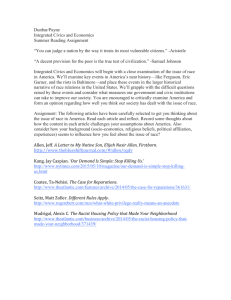Manhattan
advertisement
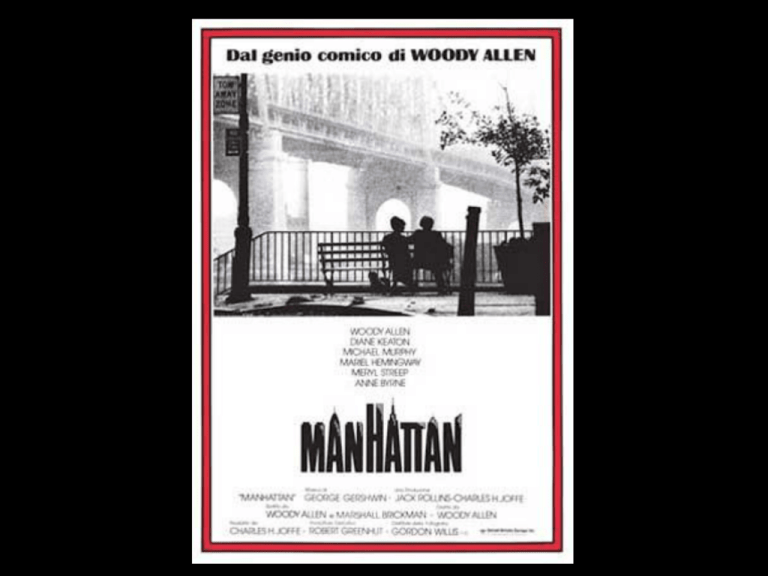
Censorship • One of the first post-Hays Code films to deal with difficulties of divorce in a serious way. • Allen is the first filmmaker to accept divorce as the norm, focusing on the wreckage of relationships and the difficulties if not flat-out impossibility of the recovery process. Woody Allen as Isaac • Twice-divorced yet intent on finding another girl. • Dumped by his lesbian wife who has written a tell-all bestseller. • Having an affair with a 17-year-old, High School girl who is far more mature and wiser than he is. • Also having an affair with the older, indecisive, pseudo-intellectual Mary. • Quits his successful comedy-writing job to write the great American novel. • Yale: “You are so self-righteous, you know. I mean we're just people. We're just human beings, you know? You think you're God.” Isaac: “I... I gotta model myself after someone.” Woody Allen as Woody Allen • Many critics have argued that Allen’s films are autobiographical and Manhattan is one where he plays himself: a neurotic New York Jew whose career involves entertaining the masses with his sense of humor and whose love life involves a continual string of mismatches and failures. Diane Keaton as Mary • • • • Mature, older, pseudo-intellectual. Nervous, searching, insecure, flawed. Having an affair with a married man, a professor named Yale. “Hey, listen. Hey, listen. I don't even wanna have this conversation. I meanreally, I mean, I'm just from Philadelphia. You know, I mean, we believe in God, so- uh, uh, okay?” • Her fling with Isaac is only because she doesn’t have anyone else to hang out with on Sunday afternoon. • She tries not to be judgmental when she first meets Tracy: “And what do you do, Tracy?” Tracy: “I go to high school.” Meryl Streep as Jill • She dumps her husband in order to have a lesbian relationship, with the boy being raised by two women. • She writes a bestselling book about it: “Marriage, Divorce and Selfhood.” • She bests Allen at every turn: • Isaac: “I did not try to run her over....it was dark...the driveway was very slippery...you know I don't drive well...” Jill: “Oh yeah? What would Freud say?” Isaac: “Freud would say I wanted to run her over. That's why he was a genius.” • How sound is Jill’s relationship when she is so obsessed with the past that she had to write a book about it? Mariel Hemingway as Tracy • High School girl having an affair with a 42-year old, divorced, out-of-work, man. • Tracy: “We oughta go cos I've got an exam tomorrow. Isaac: “Oh, do you? The kid's gotta get up... She's got homework. I'm dating a girl who does homework.” • At first she is upset that Isaac breaks up with her (he does it at a soda fountain after school!) but in short order has gained perspective and asks him to wait six months for her to return from London. Will she return and live happily ever after with Isaac? Divorce and the Single Girl • • • • Stacey Nelkin had a small part in Annie Hall (1977) that ended up on the cutting-room floor as did her part as the sixth replicant in Blade Runner (1982). She starred in Halloween III (1982) and appeared in the TV soap opera Generations in 1990. Allen cast her in a small part in his 1994 film Bullets Over Broadway. • As in all Allen films, the young girl is portrayed as far more mature than the other characters. Why? Allen’s use of sage, young girls is a commentary on marriage and relationships. Girls represent the unspoiled innocence and purity of being single (premarriage and therefore pre-divorce). Allen contrasts this with older, cynical often-divorced and/or married women. For Allen, divorce is a terribly wounding experience from which it is virtually impossible to recover. Ultimately in real life as in art, Allen chooses the young girl. Why? Because temptations and seductions are the downfall of human existence and for older, insecure, men – young girls are the ultimate temptation and therefore ultimate destructive force on their lives. For young girls, they cannot help but fall for father-figures as they try to heal the wounds of their childhoods (which of course they can rarely if ever do). At the time of shooting, Allen was reportedly involved with Stacey Nelkin, a student at New York's Stuyvesant High School, and widely thought to be the inspiration for Tracy. Nelkin went on to a minor acting career. • • • • • • • Why is this picture regarded by many as Woody Allen’s finest work? Allen deals explicitly with formerly taboo film themes such as divorce, lesbianism, and pedophilia. Allen wants us to be aware that these themes have been present throughout the 20th century even though they have not been portrayed in film. Hence his use of black and white and composer George Gershwin’s music for the score. Allen deals with the harsh realities of life in a postmodern way through humor, mixing high and low cultural references, and shattering convention. Wounded by past decisions, Allen’s protagonist is doomed to repeat his mistakes in a quixotic attempt at healing. Ultimately, like all postmodern filmmaking, if you truly “get it” the film makes you want to be a better person. And in postmodern relationship films, in order to be a better person, you have to stop searching for another person to help you heal your childhood wounds (where inevitably you will only fail and create even deeper issues) and instead heal yourself. Hence, marriage may be bad, but divorce is far worse. A Better Person Finding Meaning in a Godless/Meaningless/Postmodern World • • • • • • • • • The larger point about fear and why we continually choose selfishness over altruism is summed up by Isaac: “The important thing in life is courage…. People in Manhattan… are constantly creating these real, unnecessary, neurotic problems for themselves, because it keeps them from dealing with more unsolvable, terrifying problems about the universe." “It's very important to have some kind of personal integrity.” “What does money have to do with it? I've got enough for a year if I live like Mahatma Gandhi. My accountant says I did this at a very bad time. My stocks are down. I'm cash poor, or something. I've got no cash flow. I'm not liquid” In an interview Allen remarked, “Manhattan is about the problem of trying to live a decent life amidst all the junk of contemporary culture - the temptations, the seductions.” But has Isaac, like Allen, failed? Yes: Isaac craves selfish immortality through Tracy and his novel just as Allen has sought it through Soon-Yi and his public career. No: Life is about helping others and if via marriage and child-rearing you are able to help family members and through your work/art are able to help current and future generations, then you have succeeded in life. About this film he remarked in an interview that he had hoped to communicate “my subjective, romantic view of contemporary life in Manhattan. I like to think that, 100 years from now, if people see the picture, they will learn something about what life in the city was like in the 1970's.” Credits • • • • • • Brode, Douglas. Woody Allen: his films and career. N.J., Citadel Press, 1985. Canby, Vincent, “The Screen: Woody Allen’s ‘Manhattan,’” New York Times, April 25, 1979. Ebert, Roger, “Manhattan (1979),” www.rogerebert.com, March 18, 2001. Girgus, Sam B. The Films of Woody Allen. England: Cambridge University Press, 1993. Lax, Eric. Woody Allen. A Biography. N.Y.: Alfred A. Knopf, 1991. Stevens, Joanna. “The Inside Edge: Woody Allen in Manhattan,” http://torp.priv.no/woody/reviews/manhattanessay-stevens.html.
